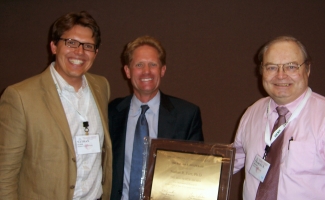Startup Survival: A Flexible Theory of Evolution

(From left): Nathan Furr, Skip Heizer of Heizer Capital, and Charles Hofer from the Heizer Awards Committee.PROVO, Utah – Oct 26, 2010 – Survival of the fittest is not only found in nature but also in business. Intrigued by the number of adaptations early-stage companies go through before getting their big break, Nathan Furr set out to determine the cause. His answer: cognitive flexibility, and his doctoral dissertation on the subject is garnering attention.
Furr, an assistant professor of entrepreneurship, received the 2010 Heizer Award from the Academy of Management, Entrepreneurship Division, for the best dissertation. He was presented the award at the Academy of Management's annual meeting in Montréal.
"In many academic circles not a lot of emphasis has been placed on the idea of firms, teams and people being able to change within an organization," Furr says. "The study looks at the role of cognition in determining whether change does occur."
Focusing on the solar panel industry, Furr began his research by conducting qualitative interviews at companies to determine the cause for change in successful businesses. He found that organizations that are more cognitively flexible are able to identify changes in the environment, opportunity or technology and consequently adjust.
"One of the predominant stereotypes of startups is that they change very little," Furr says. "This view didn't match what was being observed. I found a remarkable capacity for organizations and their managers to see their business in a new way and change."
Ultimately it's the management team's perspective that determines the organization's actions and response to change, but it starts with the individual, he says. The broader perspective and more exposure people have to new perspectives, allows for their frame of reference to adjust.
At the annual meeting, Furr also received two other awards for his dissertation from the Academy of Management along with an award for a separate research effort. He earned his doctorate in 2009 from the Stanford Technology Venture Program before returning to BYU, where he earned his MBA and undergraduate degrees.
The Heizer Award was established through the original sponsorship of the Heizer Corporation. The principal focus of the Heizer Award is on research that deals with the founding, financing, management, growth and development of new high potential ventures. The business enterprises must have venture capital investing or corporate entrepreneurship to be eligible for the award.
The Marriott School is located at Brigham Young University, the largest privately owned, church-sponsored university in the United States. The school has nationally recognized programs in accounting, business management, public management, information systems and entrepreneurship. The school's mission is to prepare men and women of faith, character and professional ability for positions of leadership throughout the world. Approximately 3,000 students are enrolled in the Marriott School's graduate and undergraduate programs.
Media Contact: Chad Little (801) 422-1512
Writer: Bethany Morgan



